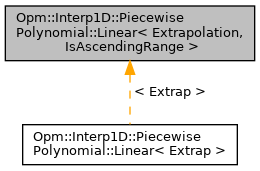#include <ECLPiecewiseLinearInterpolant.hpp>

Public Member Functions | |
| Linear (Extrapolation &&extrap) | |
| template<class ElmIterator , class ValueTransform > | |
| Linear (Extrapolation &&extrap, ElmIterator xBegin, ElmIterator xEnd, std::vector< ElmIterator > &colIt, const ValueTransform &xTransform, const std::vector< ValueTransform > &colTransform) | |
| LocalInterpPoint | classifyPoint (const double x) const |
| double | evaluate (const std::size_t col, const LocalInterpPoint &pt) const |
| const std::vector< double > & | independentVariable () const |
| Retrieve abscissas of interpolant's independent variate. More... | |
| std::vector< double > | resultVariable (const std::size_t col) const |
Detailed Description
class Opm::Interp1D::PiecewisePolynomial::Linear< Extrapolation, IsAscendingRange >
Piecewise linear interpolation in set of result columns.
- Template Parameters
-
Extrapolation Policy class for determining how to extrapolate results outside the range covered by the independent variate. Must support member functions leftandrightthat extrapolate a tabulated function to the left and right of the input range, respectively. Typically a policy class from namespace ExtrapolationPolicy.IsAscendingRange Flag for whether or not the input range is sorted ascendingly or descendingly. Class Linearassumes that the input range is sorted, so if, this implies that the input range is treated as being sorted descendingly (i.e., as if by .IsAscendingRange = false
Constructor & Destructor Documentation
◆ Linear() [1/2]
|
inlineexplicit |
Constructor.
Essentially a hack. This creates an invalid interpolant and exists only to support creating an object backed by an empty range that will be subsequently discarded and not actually used. This, in turn, is useful in the construction of live oil/wet gas property interpolants that have padded tables.
- Parameters
-
[in] extrap Instance of the configured extrapolation policy class.
◆ Linear() [2/2]
| Opm::Interp1D::PiecewisePolynomial::Linear< Extrapolation, IsAscendingRange >::Linear | ( | Extrapolation && | extrap, |
| ElmIterator | xBegin, | ||
| ElmIterator | xEnd, | ||
| std::vector< ElmIterator > & | colIt, | ||
| const ValueTransform & | xTransform, | ||
| const std::vector< ValueTransform > & | colTransform | ||
| ) |
Constructor.
- Template Parameters
-
ElmIterator Iterator over the elements of an input range or a result column. Typically .std::vector<double>::const_iteratorValueTransform Representation of a value transformation that, often, effects unit conversion of input tables. Assumed to implement a function call operator that supports the syntax w = ValueTransform(v)
- Parameters
-
[in] extrap Instance of the configured extrapolation policy class. [in] xBegin Start of range of independent variate. [in] xEnd One past the end of the range of indpendent variate. [in,out] colIt Sequence of ranges of dependent variates. On input, points to beginning of ranges. On output, each range pointer is advanced across entries. This assumes that the underlying ranges are formatted according to ECL result set conventions (TAB vector from the INIT file).std::distance(xBegin,xEnd)[in] xTransform Value transformation for the independent variate. Called for each "valid" element of the input range. [in] colTransform Sequence of value transformations for the dependent variates. In particular, is invoked on thecolTransform[i]()i-thdependent variate if and only if the corresponding element of the input range is "valid".
Member Function Documentation
◆ classifyPoint()
|
inline |
Classify an input point according to the range of the interpolant's configured independent variate.
Classification is performed according to the configured policy for treating the sort order of the input range.
- Parameters
-
[in] x Input point.
- Returns
- Classification of the input point
x.
References exprtk::details::x().
◆ evaluate()
|
inline |
Evaluate interpolant of particular dependent variable at particular input point.
- Parameters
-
[in] col Column ID of particular dependent variable. [in] pt Input point. Result of previous call to member function .LocalInterpPoint classifyPoint(const double x) constDefinition: ECLPiecewiseLinearInterpolant.hpp:123
- Returns
- Value of dependent variable
colat interpolation pointpt.
◆ independentVariable()
|
inline |
Retrieve abscissas of interpolant's independent variate.
Referenced by Opm::ECLPVT::extractRawPVTCurve().
◆ resultVariable()
|
inline |
Retrieve ordinates of one of the interpolant's dependent variates.
- Parameters
-
[in] col Column ID of particular dependent variable.
- Returns
- Ordinates corresponding to particular dependent variate, with the
i-thelement matching thei-thelement of the independent variate.
Referenced by Opm::ECLPVT::extractRawPVTCurve().
The documentation for this class was generated from the following file: